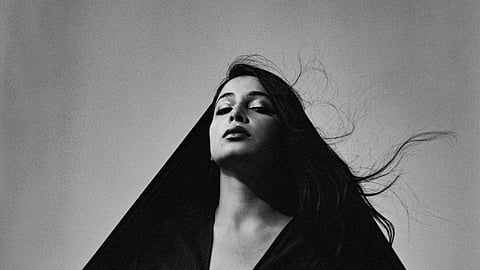
- LIFESTYLE
- FASHION
- FOOD
- ENTERTAINMENT
- EVENTS
- CULTURE
- VIDEOS
- WEB STORIES
- GALLERIES
- GADGETS
- CAR & BIKE
- SOCIETY
- TRAVEL
- NORTH EAST
- INDULGE CONNECT

You press play and within the first 45 seconds, you visualise a whodunit unravelling right in front of you. You have the first row seats to a gripping mystery and you are drawn into the world of suspense. That feeling of intrigue is what sets the base for Sheherazaad’s Dhund Lo Mujhe from her recently released mini-album, Qasr.
A prominent voice that was born from the diasporic South Asian soundscape, Sheherazaad is known to lean towards haunted, nostalgic yet ethereal themes and her songs exhibit the feeling.
As someone who grew up in an Asian American household with exposure meandering from jazz to Indian icons like Lata Mangeshkar and RD Burman, her love for music was almost instant but it also fractured her musical identity and made her feel disoriented at times.
With Qasr, she touches upon this subject of diasporic displacement, weaving Hindi and Urdu poetry to g ether with producer and Grammy-winner Arooj Aftab who made Sheherazaad feel seen and heard — two elements that sowed the seed for the album in the first place.
We speak to the singer-songwriter about her musical offerings, the power of language and her plans to perform in India.
What kind of emotions are you tapping with your mini-album?
Translating to ‘castle’ or ‘fortress’ in Urdu, Qasr to me, feels indeed like a building or monument; it’s an encapsulation of the real strains of displacement, the push and pull of diaspora and the depravity of erasure and forgotten roots. These experiences and their inherent violence, hysteria and romance imbue this sonic deep-dive into the world of the so-called in-between.
Tell us a little about your musical journey that led to the making of Qasr.
I was born into what I would describe as a ‘fanatically artcentred, Asian American household' and began ear training at home, with both my parents being band musicians and my grandmother a trailblazing Indian classical concert producer. Moving to New York for university, I quickly discovered a more radical South Asian arts community and I felt determined to resurrect and re-calibrate my singing voice to participate in this new wave I saw of diasporic music innovation and its links with political liberation. I found my northern star in the hindustani classical guru Madhuvanti Bhide, who helped me reshape my old voice, using gharana methodology.
What was the inspiration behind the single, Dhundh Lo Mujhe and how does it contribute to the overarching theme of the album?
Dhund Lo Mujhe reflects the soundscape of merging places and cultures, where the result is often abrasive, dramatic and entirely illogical. I wanted to blend this satirical, hallucinatory feel with very real and violent elements. I did want to present the lyrical standpoint of someone who is straddling worlds that are impossible to reconcile, a gender-expansive speaker who is unabashed about being mentally ill. Perhaps there was also an aspiration to create a kind of neo-folklore that strips down mythology which has been imposed upon my people, namely the model minority trope.
The song creates a feeling of suspense and thrill. Can we expect the same from other tracks of the album as well?
I think of every song as a unique character that ushers in a different world. But of course, all the songs are close relatives in my mind. The songs are simply a channelling of my homeland that I traverse physically and cognitively.
How was your experience working with Arooj Aftab? What was her reaction when you pitched her the album?
I would drop Arooj love notes for her music sporadically over the years. One day she’d told me that she’d heard some of the music I’d been releasing and suggested she could produce the next project, to my utter surprise. The process of working with her was essentially feeling so seen and held, knowing that all the iterations would pass through her shared cultural understanding and raw brilliance.
Lastly, what do you have in store for us, next? When can we expect you to perform in India?
I feel fairly shy and dazzled by the prospects of performing in India. It feels like the greatest responsibility and source of pride to return this music with its aspirational Hindi-Urdu lyricism back to the native land of its roots. To the place where current custodians of the language will receive and judge it. Perhaps the music is nomadic in nature and will never have a single home, instead gathering dispersed villages over continents. Maybe music will resist the so-called motherland and vice-versa. Or it’ll be a glorious homecoming. Still, venturing back to the subcontinent to perform Qasr would certainly feel like an exquisite expression of nature’s many cycles.
Dhund Lo Mujhe streaming on all major audio platforms.
Mail: muskankhullar @newindianexpress.com
X: @muskankhullar03